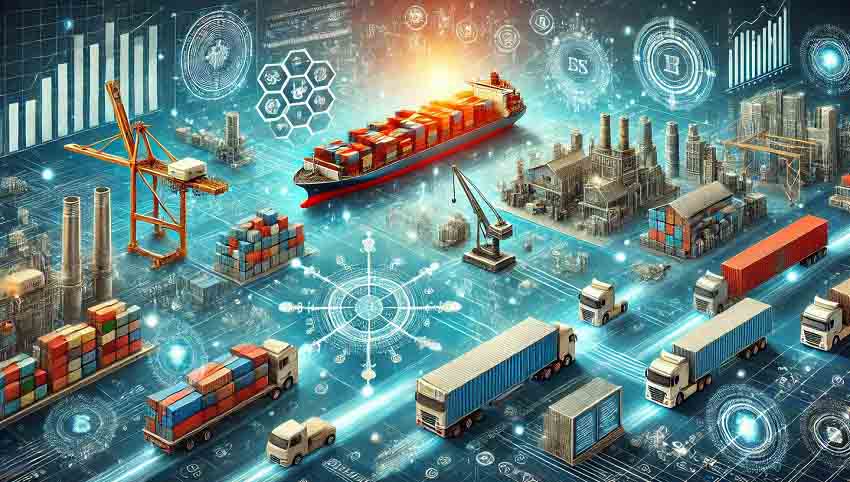Supply chain management is a critical aspect of global commerce, involving the movement of goods and information across vast networks. Traditional supply chain systems, however, often face challenges such as inefficiencies, lack of transparency, and security vulnerabilities. Blockchain technology, with its decentralized and secure nature, is poised to revolutionize supply chain management. This article explores the impact of blockchain on supply chains, highlighting its benefits, applications, and future potential.
Understanding Blockchain Technology:
Blockchain is a decentralized digital ledger that records transactions across multiple computers in a secure and transparent manner. Each transaction, or “block,” is linked to the previous one, forming a “chain” that is immutable and tamper-proof. This technology ensures that all participants in the network have access to the same information, fostering trust and accountability.
Key Features of Blockchain in Supply Chain Management:
- Transparency:
- Blockchain provides a transparent record of transactions, allowing all participants to view and verify information. This transparency reduces disputes and enhances trust among stakeholders.
- Security:
- The decentralized nature of blockchain ensures that no single entity controls the data. Each block is cryptographically secured, making it nearly impossible for hackers to alter information.
- Traceability:
- Blockchain enables the tracking of goods from their origin to the final destination. This traceability helps in identifying and addressing issues such as counterfeiting, fraud, and quality control.
- Efficiency:
- By automating processes and eliminating intermediaries, blockchain streamlines supply chain operations, reducing delays and costs.
Applications of Blockchain in Supply Chain Management:
- Provenance Tracking:
- Blockchain allows for the verification of product origins, ensuring authenticity and ethical sourcing. Industries such as food, pharmaceuticals, and luxury goods benefit from this application by providing consumers with confidence in product integrity.
- Smart Contracts:
- Smart contracts are self-executing contracts with the terms directly written into code. These contracts automatically enforce agreements when predefined conditions are met, reducing the need for intermediaries and minimizing the risk of disputes.
- Inventory Management:
- Blockchain facilitates real-time tracking of inventory levels, reducing the risk of overstocking or stockouts. This leads to better inventory management and optimized warehouse operations.
- Logistics and Shipping:
- Blockchain enhances the efficiency of logistics by providing a single source of truth for all parties involved. It improves coordination among carriers, shippers, and customs authorities, reducing delays and improving delivery times.
- Payment and Settlement:
- Blockchain enables secure and instant payments through cryptocurrencies or digital tokens. This reduces the reliance on traditional banking systems and speeds up the settlement process.
Case Studies:
- Walmart and IBM Food Trust:
- Walmart has partnered with IBM to implement blockchain technology in its food supply chain. The IBM Food Trust platform tracks the journey of food products from farm to table, ensuring food safety and reducing the time taken to trace the source of contamination from days to seconds.
- Maersk and TradeLens:
- Maersk, a global leader in container shipping, has collaborated with IBM to develop TradeLens, a blockchain-based platform for the shipping industry. TradeLens enhances transparency, reduces paperwork, and improves the efficiency of global trade.
- De Beers and Tracr:
- De Beers, a leading diamond company, uses the Tracr blockchain platform to trace the provenance of diamonds. This ensures the authenticity of diamonds and helps in preventing the circulation of conflict diamonds.
Challenges and Considerations:
- Scalability:
- Blockchain technology must handle a large volume of transactions in real-time. Scalability remains a challenge, and ongoing research aims to develop solutions that can support global supply chains.
- Interoperability:
- Different blockchain platforms may use varying protocols, making it challenging to integrate them into a unified system. Standardization efforts are crucial for achieving interoperability.
- Regulatory Compliance:
- Blockchain must comply with various regulations and standards across different regions. Businesses need to ensure that their blockchain solutions adhere to legal requirements and industry norms.
- Adoption and Change Management:
- Implementing blockchain requires a significant shift in existing processes and systems. Businesses must invest in training and change management to ensure successful adoption.
Future Potential of Blockchain in Supply Chain Management:
- Integration with IoT:
- The Internet of Things (IoT) and blockchain integration can provide real-time visibility into supply chain operations. IoT devices can capture data such as temperature, humidity, and location, which is then recorded on the blockchain for enhanced monitoring and control.
- Artificial Intelligence and Machine Learning:
- Combining blockchain with AI and machine learning can enable predictive analytics and automated decision-making. This can lead to more efficient supply chain planning and risk management.
- Sustainable and Ethical Supply Chains:
- Blockchain can promote sustainability by providing transparency into the environmental and social impact of supply chain activities. Consumers can make informed choices based on verified information about the products they purchase.
- Decentralized Marketplaces:
- Blockchain can enable the creation of decentralized marketplaces where buyers and sellers can directly interact, reducing reliance on intermediaries and lowering transaction costs.
Blockchain technology has the potential to transform supply chain management by enhancing transparency, security, traceability, and efficiency. While challenges remain, ongoing advancements and successful implementations demonstrate the value of blockchain in revolutionizing global supply chains. By embracing blockchain, businesses can achieve greater operational efficiency, build trust with stakeholders, and drive innovation in supply chain management.

